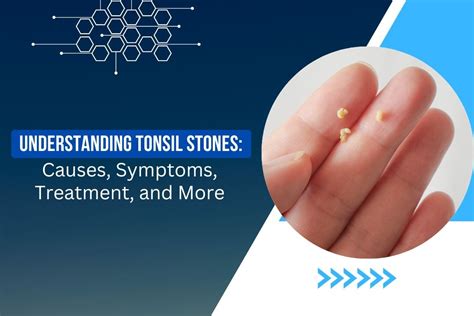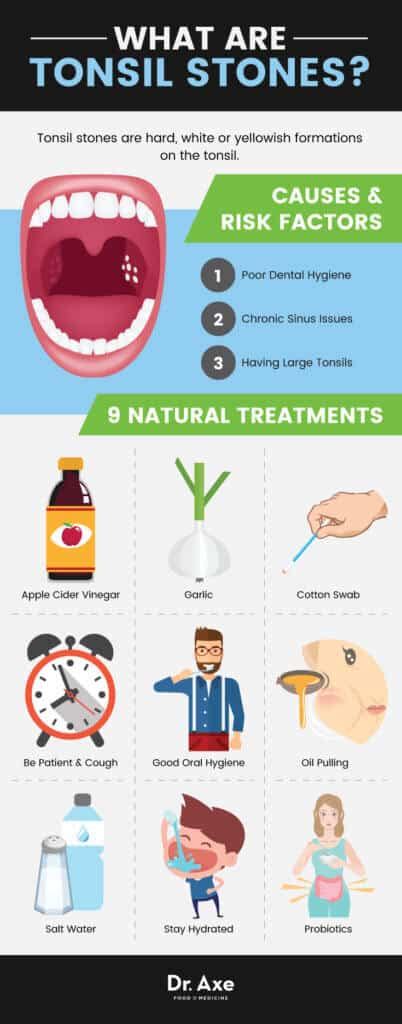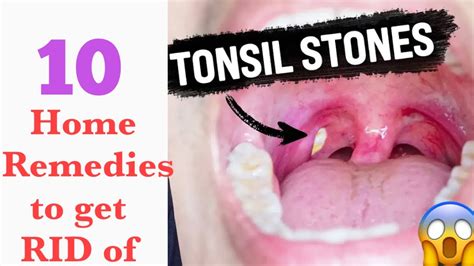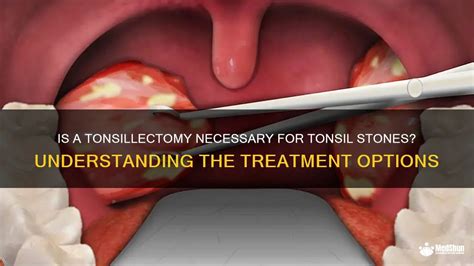Intro
Discover 5 effective ways for tonsil stones treatment, including removal, prevention, and symptom relief, using natural remedies, surgical options, and oral hygiene practices to combat bad breath, throat pain, and infection.
Tonsil stones, also known as tonsilloliths, are small, hard white or yellowish deposits that form on the surface of the tonsils. They are typically caused by the accumulation of debris, such as dead cells, mucous, and bacteria, in the crevices of the tonsils. Tonsil stones can cause bad breath, sore throats, and difficulty swallowing. If you are experiencing symptoms of tonsil stones, it is essential to seek treatment to alleviate your discomfort and prevent complications.
Tonsil stones can be treated in various ways, depending on their size and severity. Some people may be able to remove tonsil stones at home, while others may require medical attention. In this article, we will discuss the different tonsil stones treatment options available, including home remedies, medical treatments, and surgical procedures. We will also provide tips on how to prevent tonsil stones from forming in the first place. Whether you are looking for a natural remedy or a more invasive treatment, we have got you covered.
The importance of treating tonsil stones cannot be overstated. If left untreated, tonsil stones can lead to more severe health problems, such as recurrent tonsillitis, abscesses, and even respiratory infections. Furthermore, tonsil stones can be a source of embarrassment and anxiety, particularly if they cause bad breath or affect your ability to speak or eat. By understanding the different treatment options available, you can take control of your health and find a solution that works for you.
Understanding Tonsil Stones

Causes of Tonsil Stones
The causes of tonsil stones are not fully understood, but several factors can contribute to their formation. These include poor oral hygiene, large tonsils, and a diet high in sugar and dairy products. People with gastroesophageal reflux disease (GERD) or other digestive problems may also be more prone to developing tonsil stones. Additionally, individuals with a weakened immune system or underlying health conditions, such as diabetes or HIV, may be more susceptible to tonsil stones.Tonsil Stones Treatment Options

- Gargling with salt water: Gargling with warm salt water can help loosen and remove tonsil stones. Mix 1/2 teaspoon of salt with 8 ounces of warm water and gargle several times a day.
- Using a waterpik: A waterpik can help dislodge tonsil stones by flushing out the debris and bacteria that contribute to their formation.
- Antibiotics: If the tonsil stones are infected, antibiotics may be prescribed to treat the infection and reduce inflammation.
- Tonsillectomy: In severe cases, a tonsillectomy may be necessary to remove the tonsils and prevent future tonsil stones from forming.
Home Remedies for Tonsil Stones
There are several home remedies that can help alleviate the symptoms of tonsil stones and prevent them from forming in the first place. These include:- Practicing good oral hygiene: Brushing and flossing regularly can help remove bacteria and debris from the mouth and prevent tonsil stones from forming.
- Using a neti pot: Rinsing the nasal passages with a saline solution can help remove debris and reduce the risk of tonsil stones.
- Eating a healthy diet: A diet rich in fruits, vegetables, and whole grains can help boost the immune system and reduce the risk of tonsil stones.
- Staying hydrated: Drinking plenty of water can help keep the mouth and throat moist and reduce the risk of tonsil stones.
Medical Treatments for Tonsil Stones

- Antibiotic therapy: Antibiotics can help treat infected tonsil stones and reduce inflammation.
- Corticosteroids: Corticosteroids can help reduce inflammation and swelling in the throat and tonsils.
- Tonsil stone removal: In some cases, a doctor or dentist may be able to remove the tonsil stones using a specialized tool or procedure.
Risks and Complications of Tonsil Stones
If left untreated, tonsil stones can lead to more severe health problems, such as recurrent tonsillitis, abscesses, and even respiratory infections. Additionally, tonsil stones can cause bad breath, sore throats, and difficulty swallowing, which can affect a person's quality of life and overall well-being. It is essential to seek medical attention if you are experiencing symptoms of tonsil stones to prevent complications and ensure proper treatment.Surgical Options for Tonsil Stones

- Tonsillectomy: A tonsillectomy is a surgical procedure that involves removing the tonsils. This can help prevent future tonsil stones from forming and alleviate symptoms such as bad breath and sore throats.
- Laser tonsil cryptolysis: This is a minimally invasive procedure that uses a laser to remove the debris and bacteria that contribute to tonsil stone formation.
- Coblation tonsillectomy: This is a surgical procedure that uses a specialized tool to remove the tonsils and reduce the risk of bleeding and complications.
Preventing Tonsil Stones
Preventing tonsil stones is easier than treating them. Here are some tips to help reduce the risk of tonsil stones:- Practice good oral hygiene: Brushing and flossing regularly can help remove bacteria and debris from the mouth and prevent tonsil stones from forming.
- Use a neti pot: Rinsing the nasal passages with a saline solution can help remove debris and reduce the risk of tonsil stones.
- Eat a healthy diet: A diet rich in fruits, vegetables, and whole grains can help boost the immune system and reduce the risk of tonsil stones.
- Stay hydrated: Drinking plenty of water can help keep the mouth and throat moist and reduce the risk of tonsil stones.
Conclusion and Next Steps

We hope this article has provided you with a comprehensive understanding of tonsil stones and the various treatment options available. If you have any questions or concerns, please do not hesitate to comment below. Share this article with your friends and family to help raise awareness about tonsil stones and the importance of good oral health.
What are tonsil stones?
+Tonsil stones, also known as tonsilloliths, are small, hard white or yellowish deposits that form on the surface of the tonsils.
What causes tonsil stones?
+Tonsil stones are usually caused by the accumulation of debris, such as dead cells, mucous, and bacteria, in the crevices of the tonsils.
How can I prevent tonsil stones?
+Practicing good oral hygiene, using a neti pot, eating a healthy diet, and staying hydrated can help reduce the risk of tonsil stones.
What are the symptoms of tonsil stones?
+The symptoms of tonsil stones can include bad breath, sore throats, difficulty swallowing, and white or yellowish deposits on the tonsils.
How are tonsil stones treated?
+Tonsil stones can be treated with home remedies, medical treatments, and surgical procedures, depending on their size and severity.
